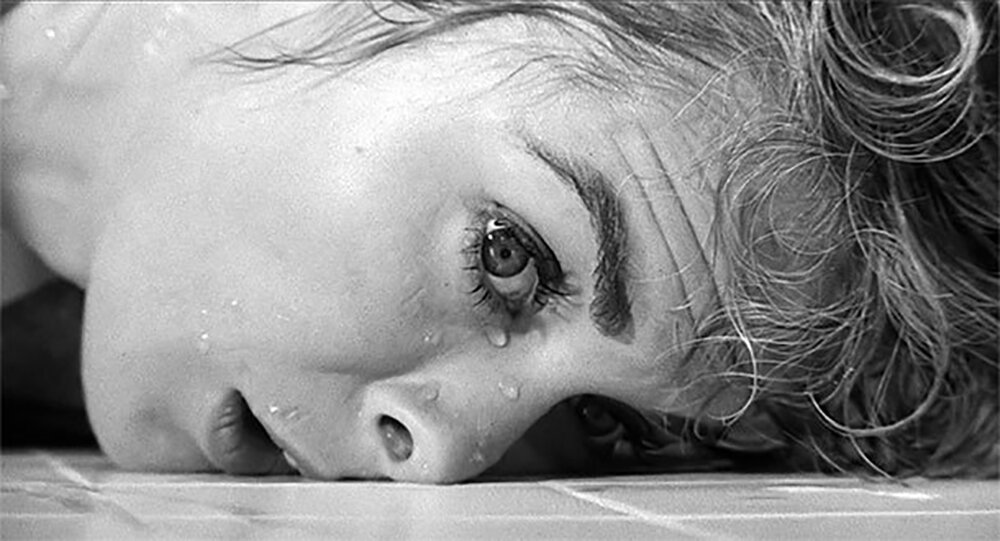Phoenix, Arizona, Friday December 11, 2:43pm.
On a sunny winter afternoon the camera pans and zooms to a half-open hotel room window. Through the darkness under a partially raised venetian blind a woman in her underwear is lying on the bed. At the end of a stolen lunch hour, her lover is dressing to leave.
When back at work she takes a chance. Stealing an envelope stuffed with $40,000 she flees town to drive to her boyfriend’s in California. As night falls she stops. The sharp morning light reveals her parked in front of a treeless hill, which belongs in an Edward Hopper painting (who is also referenced later in main house)
https://www.moma.org/collection/works/78330.
A suspicious cop raps on the window and wakes her; anxious, she moves off but he follows. Later in the cramped dark toilet of a second-hand car dealer she takes cash from her handbag, buys a new car and drives the straight roads on into the night. Violent rain and slashing windscreen wipers mix with the guilty voices of conscience, as glaring headlights grow ever bright and harsh on tired eyes. The shrill and insistent Bernard Herrmann score builds before fading to one long sombre note as she pulls off the highway to the haven offered by a glowing motel sign.
There the twitchy owner offers her tea and sandwiches. In the parlour at the back of the office they sit opposite each other, her leaning forward on the edge of the chair. Around them extended wings of stuffed birds mark the walls with long shadows. Although she isn’t fully at ease she is very much a woman of the world; his gauche and over-talkative tics are the opposite of her sexual confidence. She’s in control and knows her game, and also that he has yet to play it. So while she may be guarded, he is nervous with edgy small talk about his mother. But then he steps outside the rules of conversation and convention, as if they had never mattered to him.
You’ve never had an empty moment in your entire life, have you?
Because by god, he’s had plenty. Jolted, she continues, unable to gauge the sudden shift in power. Like hearing a record playing backwards, it becomes clear that we’ve misinterpreted everything. The linear narrative, the moral primer and the certainty of the protagonist’s world is of no interest here. So soon when he spies on her changing, before later yanking back the plastic curtain as she showers - and under flat uncinematic lighting stabbing her to death - he will take away not only her life but also the certainties of what we have been watching. Up until that point the transgressions - the underwear - twice - a sexually active and unmarried woman, the theft, the betrayal of her boss’ trust, and not least the first appearence in American cinema of a toilet - have been part of a conventional morality tale; one where guilt leads via conscience to punishment, and so redemption. Knowing what the rules are and how they have been broken, she will return the money and accept her fate; the predetermination of Presbyterian America.
But that’s her understanding, not his. Just as she stole the money by chance and turned off the road by chance, she will also die by chance. A good opportunity, a bad opportunity, is still an opportunity. A failing motel and $40,000 in her bag should be plenty of motive, but it’s meaningless. Instead, he will kill her because he wants to and because he can.
Impactful as they are, Hitchcock’s ghoulish elements and set pieces are like distant explosions. It’s only later that the aftershock hits. At the end of the film there are pat psychiatric explanations which feel like they have been grafted on by studio executives, afraid of the moral emptiness at the heart of the film - a killing without explanation. For in a culture of biblical moral certainty there can be nothing more shocking than an amoral act. There can be no good and no bad, if there just is.
More than 60 years later Psycho still retains a powerful truth. While the myth of the western frontier runs through the film, all that awaits when we turn off the road is the emptiness of Hopper’s railways, the restlessness of Hank William’s Ramblin’ Man or the cold horizon viewed by Paul Simon through the window of a Greyhound bus.
Kathy, I'm lost I said, though I knew she was sleeping
I'm empty and aching and I don't know why
Seek and ye shall find. Yes. But what, exactly?
